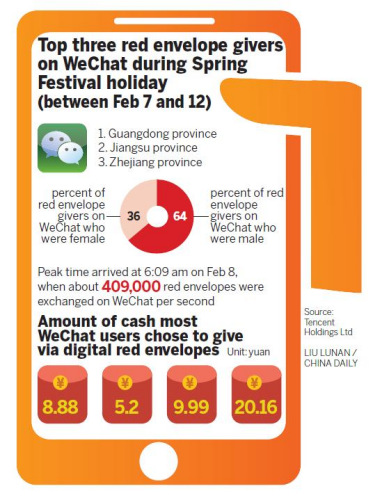
With about one third of China's 1.3 billion population exchanging online gift money on the eve of Lunar New Year, the tradition of giving red envelopes of lucky money has become a nationwide digitalized carnival.
Behind the carnival are Internet companies, greedy for a larger share of online payment market, penetration into smaller cities, an expanded age range and a restructuring of their social network.
Traditionally, Chinese people give red paper envelopes of money, known as "hongbao," to younger friends and relatives during the Lunar New Year celebrations. The "tradition" -- if it can still be called that -- has evolved since Tencent launched red envelopes on its WeChat messenger two years ago. The idea of giving hongbao to peers or older people is more or less a new one. Other Internet firms including Alibaba, Baidu and Sina Weibo followed suit.
About eight billion "hongbao" were exchanged by 420 million users via WeChat on Feb. 7, the Lunar New Year's eve, more than 500 times more than in 2014. Over 100 million users shared 800 million yuan (123 million U.S. dollars) of cash gifts via Alipay, the payment system run by Alibaba.
To Li Chao with iResearch Consulting Group, this is "a marketing war in a red envelope."
"The Internet companies are popularizing the habit of mobile payments through entertaining means," Li said, noting that not only promotes their payment system for their own benefit, but also for traditional companies attached to their systems.
"They are hoping people's enthusiasm on hongbao will extend to mobile payment in normal times," Li said.
According to Tencent, the red envelopes are expanding to small cities and rural areas, and from the young to the elderly.
While people born in the 1990s sent nearly 2.6 billion envelopes, grandpas and grandmas also registered WeChat accounts and joined in. People born in the 1960s handed out more than 166 million.
Big cities and young people are the main Internet users, according to Yin Zhentao, a financial expert with the Chinese Academy of Social Sciences (CASS), and when they went home during the holiday, they actually promoted mobile payment there.
Jiang Qiping, secretary general of the CASS Information Research Center, believes digital red envelopes are restructuring social networks.
"The digital red envelope comes with ready-made unique Chinese cultural connotations," Jiang said, noting that it enables parents and children to engage in a new kind of communication like that between friends.
Alipay figures show that red envelopes are no longer a privilege of the old to transfer money to the young. People born in the 1980s and 1990s sent gifts of 518.2 yuan on average to those born in the 1950s and 1960s. The digital red envelope is a new channel for the young to show gratitude to the elderly.


















































